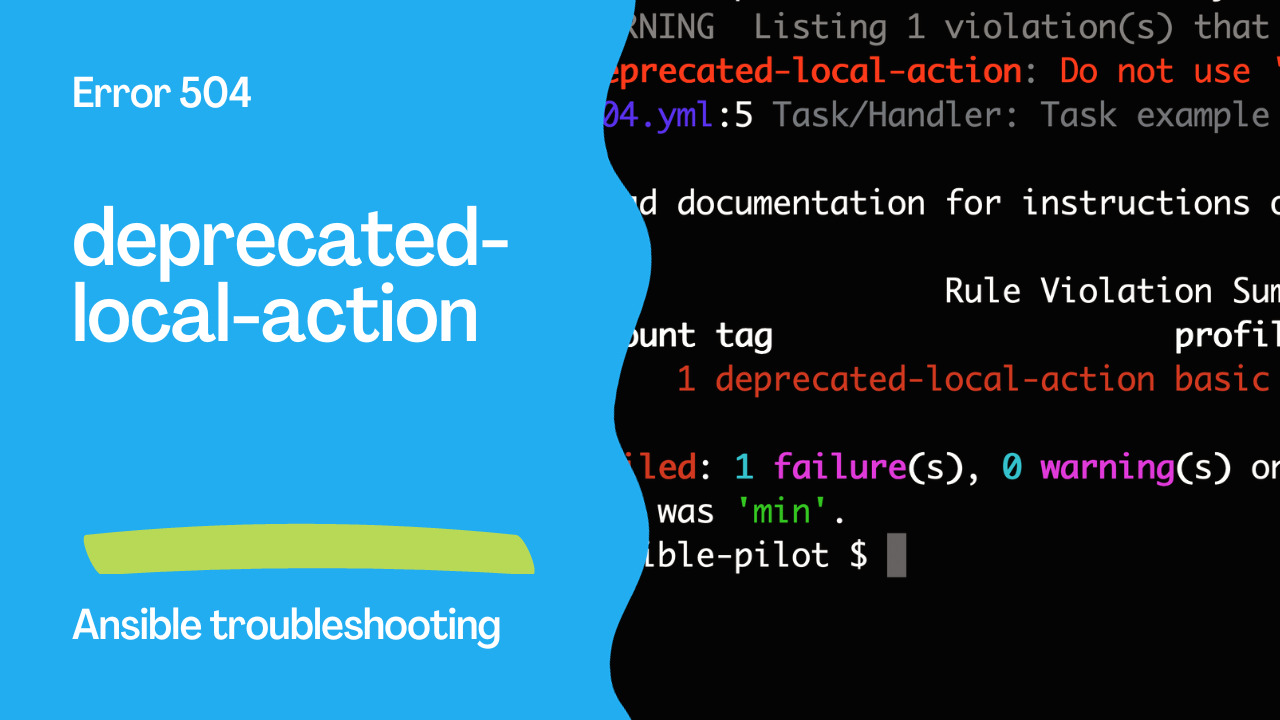Introduction
Ansible, the powerful automation and orchestration tool, is continually evolving to enhance its capabilities and streamline automation processes. To maintain efficient and up-to-date playbooks, it’s crucial to adhere to best practices and follow recommended guidelines. Ansible Lint Rule 504, known as “deprecated-local-action,” addresses a practice that is no longer considered best practice in the Ansible ecosystem.
The Local Action Dilemma
In the realm of Ansible playbooks, local actions refer to tasks executed on the control node where Ansible is run. While there are scenarios where local actions are necessary, the Ansible community has shifted towards using a more structured and robust method for handling these tasks.
The problematic code that Ansible Rule 504 targets typically looks like this:
---
- name: Example of deprecated-local-action rule
hosts: all
tasks:
- name: Task example
local_action: # <-- this is deprecated
module: ansible.builtin.debug
In this code snippet, the local_action key is used to specify a task to run on the local control node. While this approach can work, it is considered deprecated, and newer Ansible practices recommend a more explicit and structured approach.

The Recommended Solution
To address the deprecation of local actions, Ansible Lint Rule 504 recommends using the delegate_to: localhost option. This alternative approach is more explicit, aligning with the current best practices in Ansible playbook development. Here is the correct way to structure the code:
---
- name: Example of deprecated-local-action rule
hosts: all
tasks:
- name: Task example
ansible.builtin.debug:
delegate_to: localhost # <-- recommended way to run on localhost
Output:
WARNING Listing 1 violation(s) that are fatal
deprecated-local-action: Do not use 'local_action', use 'delegate_to: localhost'.
504.yml:5 Task/Handler: Task example
Read documentation for instructions on how to ignore specific rule violations.
Rule Violation Summary
count tag profile rule associated tags
1 deprecated-local-action basic deprecations
Failed: 1 failure(s), 0 warning(s) on 1 files. Last profile that met the validation criteria was 'min'.
By using delegate_to: localhost, you ensure that the task is explicitly executed on the control node. This approach is not only more in line with modern Ansible standards but also enhances the clarity and maintainability of your playbooks.
Benefits of Using delegate_to: localhost
There are several compelling reasons for adopting the delegate_to: localhost approach:
Alignment with Best Practices: Following recommended practices in Ansible playbook development ensures that your code remains relevant and maintainable as Ansible evolves.
Improved Readability: Using
delegate_to: localhostprovides greater clarity in your playbooks, making it easier for you and your team to understand the intended execution of tasks.Maintainable Code: Code that adheres to current best practices is more likely to be maintained effectively over time, even as the Ansible ecosystem evolves.
Conclusion
In the ever-evolving landscape of Ansible automation, it’s essential to stay updated with the latest best practices. Ansible Lint Rule 504, “deprecated-local-action,” underscores the importance of adopting the delegate_to: localhost approach over deprecated local actions. By following this recommendation, you ensure that your Ansible playbooks remain aligned with the latest standards and maintainable for the long term. Your automation processes will benefit from improved clarity, readability, and adherence to best practices, resulting in more efficient and robust playbook execution.
Academy
Learn the Ansible automation technology with some real-life examples in my
Udemy 300+ Lessons Video Course.

My book Ansible By Examples: 200+ Automation Examples For Linux and Windows System Administrator and DevOps

Donate
Want to keep this project going? Please donate
